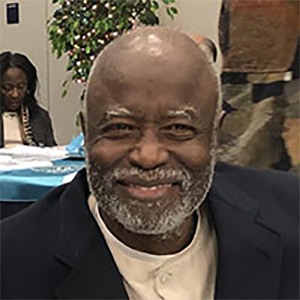Bill William Carter Jenkins
Courtesy of Diana Rowley
Educational Background: PhD, Epidemiology, The University of North Carolina at Chapel Hill; Masters, Public Health, The University of North Carolina at Chapel Hill; Masters, Biostatistics, Georgetown University
Bill William Carter Jenkins was born in Mt. Pleasant, South Carolina, and graduated from Morehouse College with a degree in mathematics in 1967. He earned a master’s in biostatistics from Georgetown University in 1974, a master’s in public health from The University of North Carolina at Chapel Hill (UNC) in 1977, and a PhD in epidemiology from UNC in 1983. He then completed a postdoc in biostatistics at Harvard University in 1987 and received an honorary doctorate from the Medical University of South Carolina in 2011.
Jenkins began his career as a statistician in the National Center for Health Statistics (NCHS). He was a biostatistician by day and an activist by night. That combination led him to become the first equal opportunity employment officer for NCHS, and he insisted the agency develop a better upward mobility path for African-American nonscience workers stuck in low-wage jobs. It was during that time—when he was in his early 20s—he learned of the infamous Tuskegee syphilis study and worked to expose it. Jenkins helped extract an official apology from the federal government for the study and produced a documentary with the survivors.
In the 1980s, at the beginning of the AIDS epidemic, Jenkins was a mathematical statistician at the Centers for Disease Control and Prevention (CDC) Division of Sexually Transmitted Diseases and one of the first people to project the spread of AIDS in the black community. He directed CDC’s first community-based funding program for AIDS/HIV, discussed in Chapter 5 of the 1992 edition of Health Issues in the Black Community.
Jenkins was an adjunct professor of epidemiology at the UNC Gillings School of Global Public Health and a fellow in the American College of Epidemiology. He was active in the ASA’s Statistics in Epidemiology Section. In 1991, he—along with a group of African-American epidemiologists and statisticians—founded the Society for the Analysis of African-American Public Health Issues (SAAPHI), an affiliate of the American Public Health Association, a nonprofit national public health organization dedicated to improving the overall health of African Americans.
Jenkins died February 17, 2019, of complications from sarcoidosis. He is survived by his wife, Diana Rowley—also an epidemiologist—and their daughter, Danielle Rowley-Jenkins.
More About Jenkins
“Bill Jenkins, Who Tried to Halt Tuskegee Syphilis Study, Dies at 73”
The New York Times“Gillings School Mourns Loss of Bill Jenkins, Advocate for Minority Health and Witness Against Racism”
Gillings School NewsResources compiled by Victor Schoenbach


















